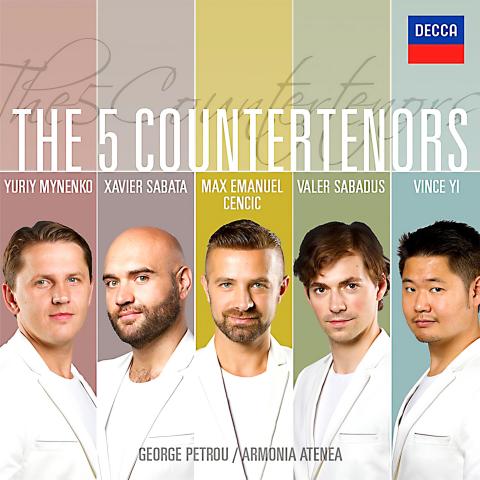RASKATOV/ STRAVINSKY,
Piano Concerto “Night Butterflies,”
Rite of Spring

Tomoko Mukaiyama, piano,
Seattle Symphony Media SSM 1005 [CD]
FAURE

Masques et Bergamasques, etc.
Seattle Symphony
Seattle Symphony Media SSM 1004 [CD]

THE FIVE COUNTERTENORS
Cencic, Mynenko, Sabata, Sabadus, Yi
Decca 4788094 [CD]

SCHUBERT AND SCHUBERT/LISZT
Marina Yakhlakova, piano
Master Performers
MPI 14 002 [DVD]
In the 18th century opera was dominated by castrated male singers who combined a high vocal range with masculine force, apparently to astonishing effect. When the practice was abandoned as inhumane at the time of the French Revolution, these old operas were either left unsung or performed using sopranos or, with transposed music, tenors or even baritones. This continued until late in the 20th century.
Fortunately, however, nature provides a number of men with naturally very high voices, and these “countertenors” increasingly came into demand with the movement for more authentic performances of 18th century music. This movement has accelerated over the last 20 years, so that today there are quite a large number of highly-trained countertenors working in the opera world. Five of them are featured on a very fine CD issued this month by Decca, The Five Countertenors.
Where they come from is almost as varied as the character of their voices. Yuriy Mynenko is from the Ukraine, Max Erasmus Cencic from Croatia, Valer Sabadus from Romania, Xavier Sabata from Spain’s Catalonia, while Vince Yi is a Korean/American. Each contributes two items to the CD.
It’s impossible to make a choice from among these brilliant voices. Cencic is highly professional, Sabate vengefully dramatic where necessary, Yi extraordinarily pure and incisive, Mynenko incredibly versatile, while Sabadus has perhaps the fullest voice of them all.
All five sing mostly items from little-known operas, though many of them were celebrated in their day. This CD is well worth buying or down-loading — my only wish is that it had been a DVD. But a sort of video sampler is available if you go to YouTube and key in “the five countertenors.” It’s the first item to come up.
Marina Yakhlakova is a young Russian pianist featured on a new DVD from the Australian label Master Performers. It was recorded in the Mechanics Hall, Worcester, Massachusetts, US last February.
Liszt’s transcriptions of some of Schubert’s songs for solo piano have been described as dramatic despite having no words and no singing voice. But when there’s no audience either you do begin to wonder. Yakhlakova sits there alone in this famous auditorium wearing a black pullover and simply plays. No pianist I’ve ever seen displays less apparent emotion, and the absence of an audience adds to the sense of isolation and solitude.
Yet these Liszt transcriptions are nothing if not bravura virtuoso pieces. They’re fashioned as vehicles for the showman, the characteristic Romantic-era pianist with his heart on his sleeve playing in front of adoring spectators. As a result, Yakhlakova’s fine performance of Schubert’s introspective Sonata in A Minor (D.845) earlier on this DVD is far more effective because more suited both to the recording situation and to this performer’s stage persona.
Faure’s self-effacing music is often thought of as for connoisseurs. But the Seattle Symphony has come up with a delightful CD of some of his less familiar orchestral works. This may not be one of the US’s most famous orchestras, but the music here is beautifully played and very well recorded.
Some of the items were created to accompany theater plays. The mellow and understated Masques et bergamasques is one, written late in Faure’s life. It’s reminiscent of Gustav Holst’s music, his St Paul’s Suite for instance. (Both men, near-contemporaries, were unsure if they could live off their compositions, Faure teaching at the Paris Conservatory and Holst at London’s St Paul’s Girls School).
There’s also a suite here made out of music written to accompany a London production of Pelleas et Melisande, not Debussy’s 1898 opera but Maurice Maeterlinck’s original play of 1892. Even more Holst-like is a short item that used to be one of Faure’s best-known pieces, the Berceuse for Violin and Orchestra, played here with the Seattle’s concert master, Russian-born Alexander Velinzon as soloist.
The Seattle Symphony is best-known for its championing of contemporary composers, and a major release is its premier recording of a piano concerto, Night Butterflies, by the Russian composer, now resident in France, Alexander Rastakov (born in 1953). This work is a wonderful and welcome break with old-fashioned modernism. Often percussive and even explosive it may be, but in an attention-grabbing performance by the Japanese-born pianist Tomoko Mukaiyama it makes for compelling listening.
Mukaiyama is also a performance artist, and in the last movement of this 12-movement concerto she has to break into wordless song. The piece was especially composed for her, and it’s doubtful if many other classical pianists will be able to follow in her footsteps.
Raskatov is best-known in Europe for his 2010 opera A Dog’s Heart, based on a long-suppressed anti-Soviet satire by Mikhail Bulgakov, eventually released in 1987. The opera was performed in France and the Netherlands, and at both London’s ENO and Milan’s Teatro alla Scala. Plans to include it in the New York Met’s 2015 season had to be canceled, apparently following differences with Bulgakov’s literary heirs.
The appearance of this CD, in other words, is a major event. It concludes with Stravinsky’s Rite of Spring, ostensibly on the grounds that 100 years separates the two works. But the real reason may be to boost the CD’s sales — a boost, it must be added, that the fine Raskatov concerto very much deserves.

March 31 to April 6 On May 13, 1950, National Taiwan University Hospital otolaryngologist Su You-peng (蘇友鵬) was summoned to the director’s office. He thought someone had complained about him practicing the violin at night, but when he entered the room, he knew something was terribly wrong. He saw several burly men who appeared to be government secret agents, and three other resident doctors: internist Hsu Chiang (許強), dermatologist Hu Pao-chen (胡寶珍) and ophthalmologist Hu Hsin-lin (胡鑫麟). They were handcuffed, herded onto two jeeps and taken to the Secrecy Bureau (保密局) for questioning. Su was still in his doctor’s robes at

A vaccine to fight dementia? It turns out there may already be one — shots that prevent painful shingles also appear to protect aging brains. A new study found shingles vaccination cut older adults’ risk of developing dementia over the next seven years by 20 percent. The research, published Wednesday in the journal Nature, is part of growing understanding about how many factors influence brain health as we age — and what we can do about it. “It’s a very robust finding,” said lead researcher Pascal Geldsetzer of Stanford University. And “women seem to benefit more,” important as they’re at higher risk of

Last week the Democratic Progressive Party (DPP) said that the budget cuts voted for by the China-aligned parties in the legislature, are intended to force the DPP to hike electricity rates. The public would then blame it for the rate hike. It’s fairly clear that the first part of that is correct. Slashing the budget of state-run Taiwan Power Co (Taipower, 台電) is a move intended to cause discontent with the DPP when electricity rates go up. Taipower’s debt, NT$422.9 billion (US$12.78 billion), is one of the numerous permanent crises created by the nation’s construction-industrial state and the developmentalist mentality it

Experts say that the devastating earthquake in Myanmar on Friday was likely the strongest to hit the country in decades, with disaster modeling suggesting thousands could be dead. Automatic assessments from the US Geological Survey (USGS) said the shallow 7.7-magnitude quake northwest of the central Myanmar city of Sagaing triggered a red alert for shaking-related fatalities and economic losses. “High casualties and extensive damage are probable and the disaster is likely widespread,” it said, locating the epicentre near the central Myanmar city of Mandalay, home to more than a million people. Myanmar’s ruling junta said on Saturday morning that the number killed had